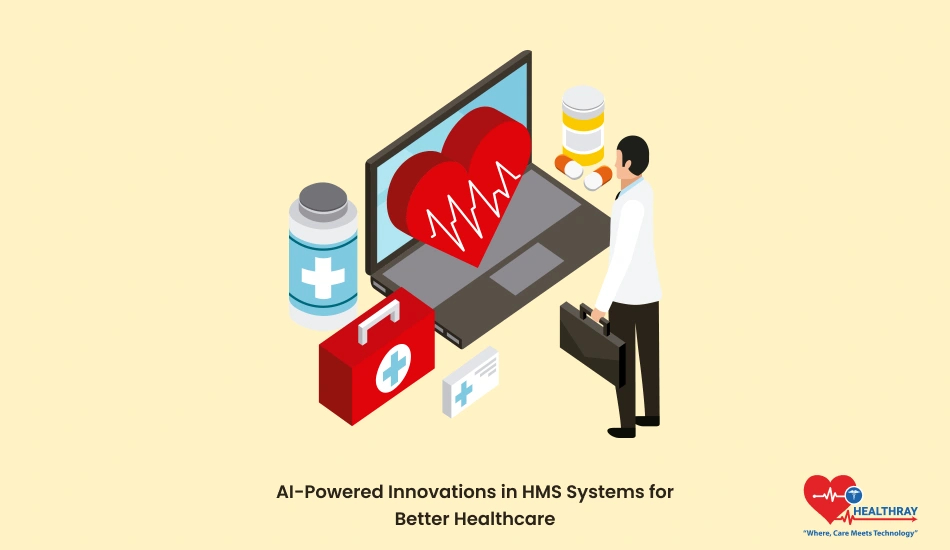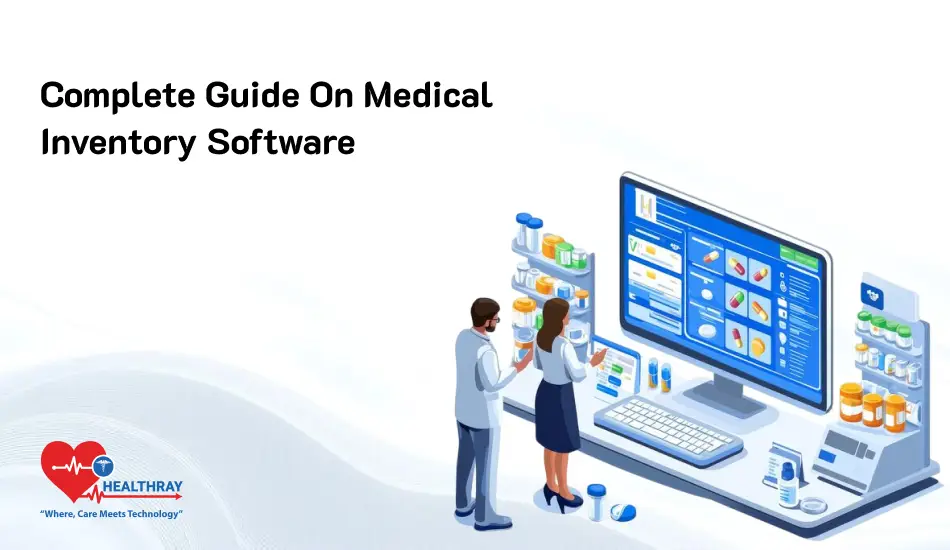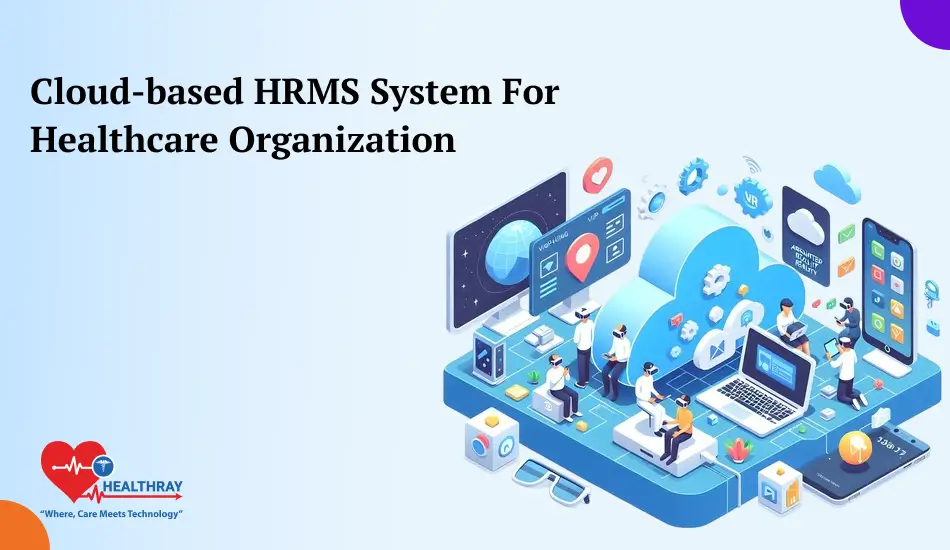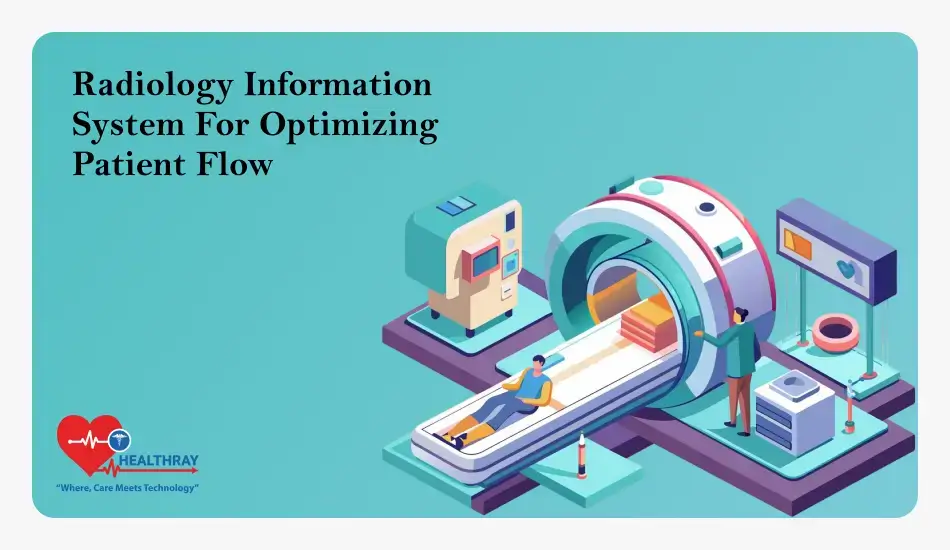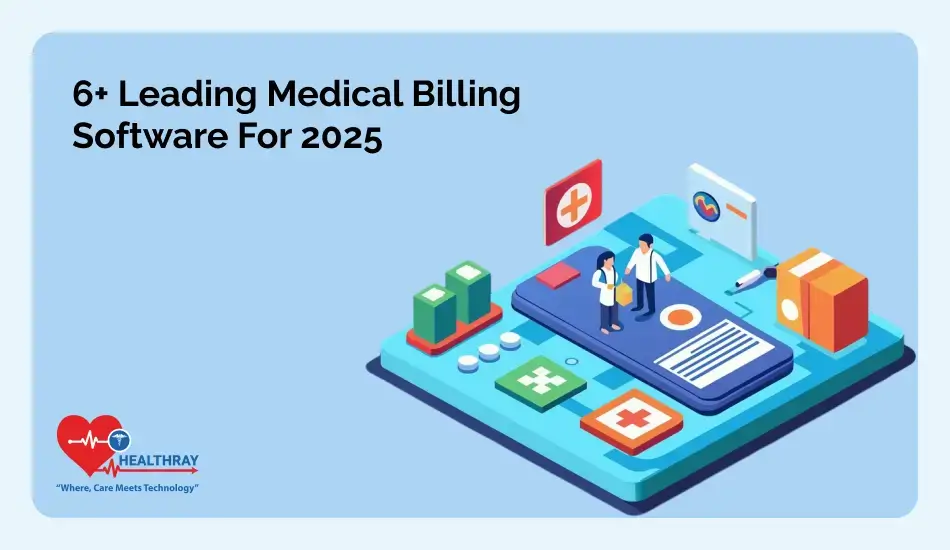AI is no longer a futuristic concept in healthcare—it’s reshaping the way hospitals manage their operations today. From streamlining administrative tasks to enhancing patient care, AI-powered innovations in hospital management systems (HMS) are enabling healthcare providers to work smarter, not harder.
For healthcare administrators, IT decision-makers, and medical practitioners, these advancements bring opportunities to improve efficiency, reduce errors, and allocate resources effectively. But how exactly does AI fit into hospital management? And more importantly, what are the real-world benefits?
In this article, we’ll explore the latest AI-powered innovations in the Hospital Management Software, their practical applications, and how healthcare professionals can integrate these technologies into their daily operations.
Benefits of AI in Hospital Management Systems
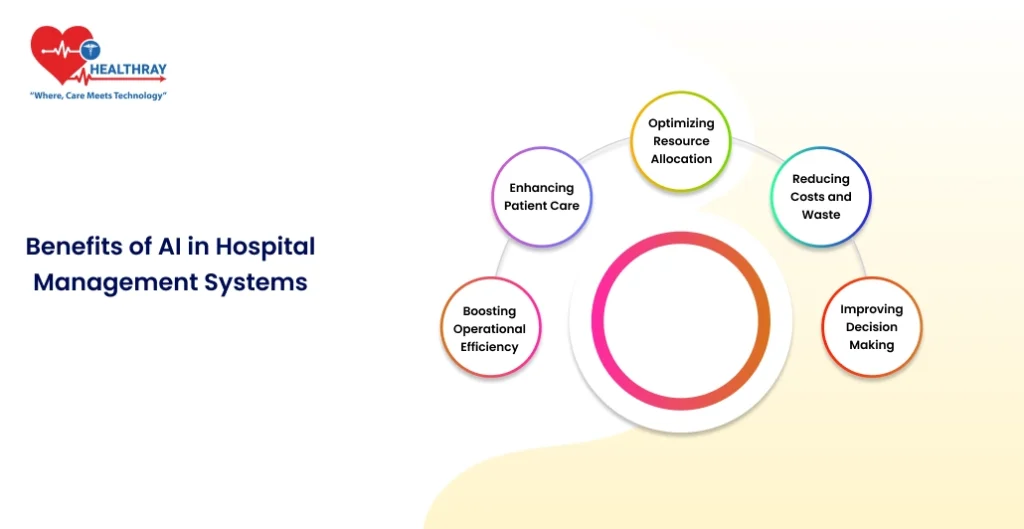
Boosting Operational Efficiency
AI streamlines processes by automating repetitive tasks such as appointment scheduling, billing, and inventory management. This reduces human errors and allows staff to focus on more critical responsibilities. Hospitals using AI-powered tools often report shorter wait times, improved workflow, and better overall management of resources.
Enhancing Patient Care
AI in HMS Software enables more personalized and timely patient care. Tools like predictive analytics help forecast patient needs, allowing medical staff to prepare and respond proactively. For example, AI can analyze a patient’s medical history to suggest tailored treatment plans or monitor real-time data to alert physicians about critical health changes.
Optimizing Resource Allocation
In the healthcare industry, resource mismanagement is a prevalent problem. AI tackles this by examining trends in staff usage, bed availability, and hospital admissions. It assists hospitals in more efficiently allocating resources, such as personnel, equipment, or rooms, by forecasting demand, guaranteeing seamless operations even during periods of high demand.
Reducing Costs and Waste
AI can identify inefficiencies in hospital processes, whether it’s excess spending on supplies or underutilized equipment. Predictive maintenance tools also minimize equipment downtime, ensuring that vital machines are always operational. This leads to significant cost savings over time.
Improving Decision-Making
Hospital administrators and IT decision-makers benefit from AI’s ability to deliver actionable insights. With advanced data visualization and analysis tools, decision-makers can assess performance metrics, patient satisfaction, and financial health in real-time. This empowers them to make data-driven decisions quickly.
AI Applications in Hospital Management Systems
Predictive Analytics for Patient Admissions and Staffing
AI helps hospitals predict patient admission rates based on historical data, seasonal trends, and local health patterns. This ensures optimal staffing levels and avoids both overstaffing and understaffing. For instance, during flu season, predictive tools can forecast increased patient inflow, allowing administrators to allocate resources accordingly.
Automation of Administrative Tasks
Time-consuming administrative duties include scheduling appointments, keeping track of patient information, and handling insurance claims. AI-powered solutions automate these procedures, allowing employees to concentrate on more strategic tasks. In addition to increasing productivity, this reduces the possibility of human error in billing and documentation.
Clinical Decision Support Systems (CDSS)
AI enhances clinical decision-making by providing real-time recommendations based on patient data. For example, it can flag potential drug interactions, suggest alternative treatments, or identify early warning signs of complications. This supports medical practitioners in delivering safer and more effective care.
Patient Engagement and Personalized Care
AI-powered chatbots and virtual assistants keep patients engaged by answering queries, sending reminders, and providing health tips. Personalized care is further enhanced by analyzing patient preferences and medical history to tailor treatment plans. This boosts patient satisfaction and adherence to prescribed care routines.
Resource Management and Optimization
AI tracks and monitors hospital resources, including beds, equipment, and medication. For example, it can predict when specific equipment will require maintenance or identify underutilized assets. This level of resource management reduces wastage and ensures uninterrupted care delivery.
Advanced Diagnostics and Imaging
AI has revolutionized diagnostics, particularly in areas like radiology and pathology. AI tools analyze medical images faster and often with greater accuracy than traditional methods, identifying anomalies that could be missed by the human eye. This speeds up diagnoses and helps detect conditions early.
Emergency Response and Patient Triage
Artificial intelligence algorithms evaluate patient data in emergency scenarios to rank the priority of care. For instance, AI-powered triage systems are able to assess symptoms and assign severity levels, guaranteeing that urgent cases receive timely attention. The effectiveness of emergency rooms is improved by this.
Implementation Strategies for AI in Hospital Management Systems
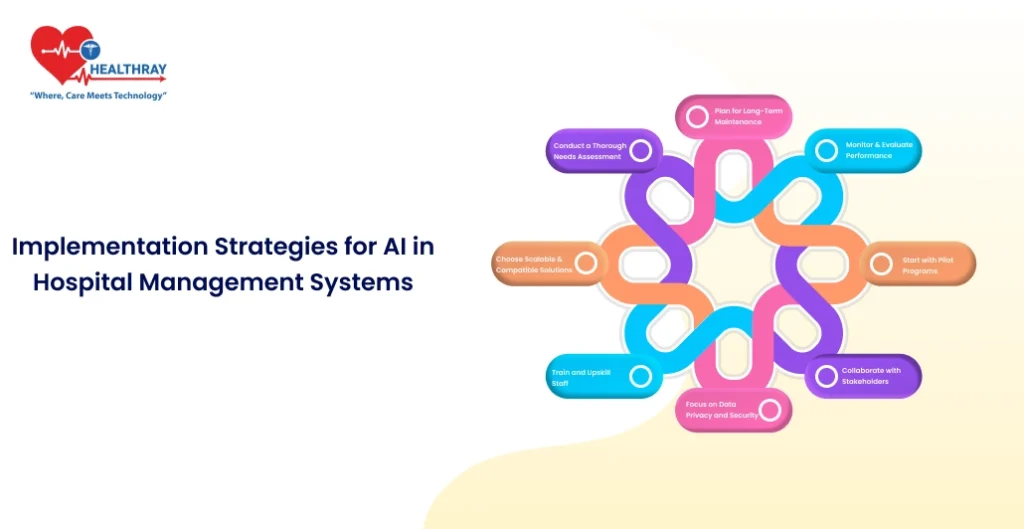
Conduct a Thorough Needs Assessment
Before implementing AI, hospitals must identify specific challenges they aim to address. Whether it’s improving patient flow, reducing administrative burdens, or enhancing diagnostic accuracy, a clear understanding of needs ensures the right AI tools are chosen for the job.
Choose Scalable and Compatible Solutions
AI systems should integrate seamlessly with existing hospital management software. Look for solutions that are scalable, allowing for future upgrades and expansions. Compatibility ensures minimal disruptions during implementation and avoids costly infrastructure overhauls.
Train and Upskill Staff
AI adoption requires staff to understand and operate the new systems effectively. Conduct workshops, provide hands-on training, and create a support system to help employees adapt. Training programs should address both technical skills and data interpretation to maximize AI’s potential.
Focus on Data Privacy and Security
Healthcare data is highly sensitive, and AI systems must comply with regulations like HIPAA (in the U.S.) and GDPR (in Europe). Implement strong encryption, access controls, and regular audits to safeguard patient information. Partnering with vendors who prioritize security can mitigate risks.
Collaborate with Stakeholders
All stakeholders, including administrators, IT teams, and medical practitioners, must provide input for successful implementation. Open communication ensures that the AI system is aligned with the organization’s goals and meets the specific needs of each department.
Start with Pilot Programs
Rather than deploying AI across the entire hospital at once, start with smaller pilot programs in specific departments. For instance, test AI-driven scheduling in outpatient services or predictive analytics in emergency departments. This allows for adjustments before full-scale implementation.
Monitor and Evaluate Performance
Set measurable goals for AI implementation, such as reduced wait times, improved patient outcomes, or cost savings. Regularly monitor the system’s performance and gather feedback from users. Use these insights to refine processes and optimize results.
Plan for Long-Term Maintenance
AI systems require ongoing updates and maintenance to stay effective. Establish a dedicated team or partner with reliable vendors for technical support. Regular updates ensure the AI remains compatible with new regulations and advancements in technology.
Challenges and Considerations in Implementing AI-Powered HMS
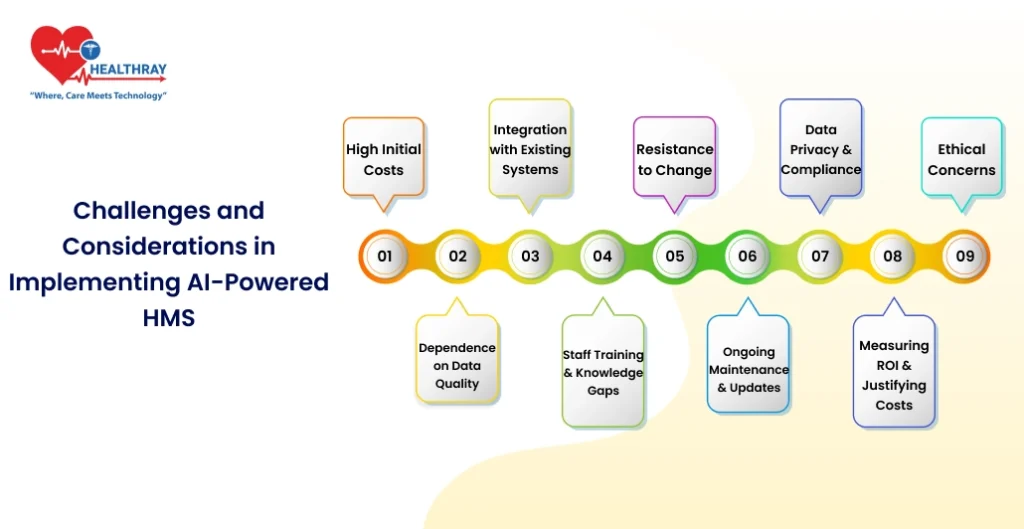
High Initial Costs
AI implementation can be expensive, requiring investments in software, hardware, and training. Smaller hospitals or facilities with limited budgets may struggle to justify these upfront costs, even though AI can deliver significant long-term savings.
Integration with Existing Systems
Many hospitals already use legacy hospital management software system platforms, and integrating AI solutions with these systems can be complex. Compatibility issues may require significant customization, leading to delays and additional expenses.
Resistance to Change
Employees who are concerned about job displacement or lack confidence in new technology frequently oppose the introduction of AI. Addressing these concerns through open communication and demonstrating AI’s role in assisting, not replacing, human workers is critical.
Data Privacy and Compliance
AI systems rely on vast amounts of patient data, raising concerns about privacy and security. Hospitals must comply with regulations like HIPAA and GDPR to protect sensitive information. Any breach can erode trust and lead to legal consequences.
Ethical Concerns
AI introduces ethical dilemmas, such as biases in algorithms that could impact decision-making. For instance, if AI systems are trained on biased datasets, they may produce inequitable outcomes for certain patient groups. Hospitals must ensure fairness in AI applications.
Dependence on Data Quality
AI systems are only as good as the data they analyze. Poor-quality, incomplete, or inaccurate data can lead to incorrect predictions or decisions, compromising patient care. Establishing robust data management practices is crucial.
Staff Training and Knowledge Gaps
Healthcare professionals may lack the technical skills required to use AI effectively. Without proper training, the potential of AI systems may go unrealized, leading to frustration and underperformance.
Ongoing Maintenance and Updates
AI technology evolves rapidly, requiring continuous updates to stay relevant. Maintenance costs and the need for periodic retraining of staff can pose ongoing challenges for hospitals.
Measuring ROI and Justifying Costs
Hospitals often struggle to quantify the return on investment (ROI) of AI systems. While benefits like improved efficiency and patient outcomes are evident, translating these into financial terms can be challenging for stakeholders.
Case Studies: Successful AI Integration in Hospital Management
Predictive Analytics Reducing Emergency Wait Times
A mid-sized urban hospital implemented an AI-powered predictive analytics tool to manage patient flow in its emergency department. By analyzing historical data and real-time patient intake, the system predicted surges in admissions and optimized staffing schedules. The result was a 30% reduction in patient wait times, improving both operational efficiency and patient satisfaction.
Automating Administrative Tasks in a Large Healthcare Network
A healthcare system with multiple facilities deployed AI to handle administrative processes like appointment scheduling, billing, and insurance claims. AI algorithms processed claims faster, reducing the rejection rate by identifying errors upfront. This saved the network approximately $2.5 million annually and allowed administrative staff to focus on patient-facing tasks.
AI-Assisted Diagnosis in Radiology
A hospital specializing in oncology adopted AI to assist radiologists in detecting tumors from imaging data. The AI system flagged anomalies with high accuracy, reducing diagnostic errors by 15%. Radiologists reported that AI saved them time and allowed them to focus on complex cases requiring human expertise.
Improving Resource Management in a Rural Hospital
A rural hospital faced challenges with equipment downtime and bed availability. AI-based resource management tools predicted when critical equipment would require maintenance and provided real-time updates on bed occupancy. This proactive approach reduced equipment downtime by 40% and increased patient throughput.
Enhancing Patient Engagement in an Outpatient Clinic
An outpatient clinic introduced an AI-powered chatbot to engage patients. The chatbot handled appointment reminders, answered FAQs, and provided medication instructions. Patient satisfaction scores improved significantly, with 85% of patients reporting quicker responses to their queries compared to traditional phone support.
AI-Powered Clinical Decision Support in a Cardiology Department
A leading cardiology center used AI to enhance its clinical decision support system. The tool analyzed patient data to predict potential complications during surgery. Surgeons leveraged these insights to adjust preoperative plans, reducing surgical complications by 20%.
Future Trends in AI for Hospital Management Systems
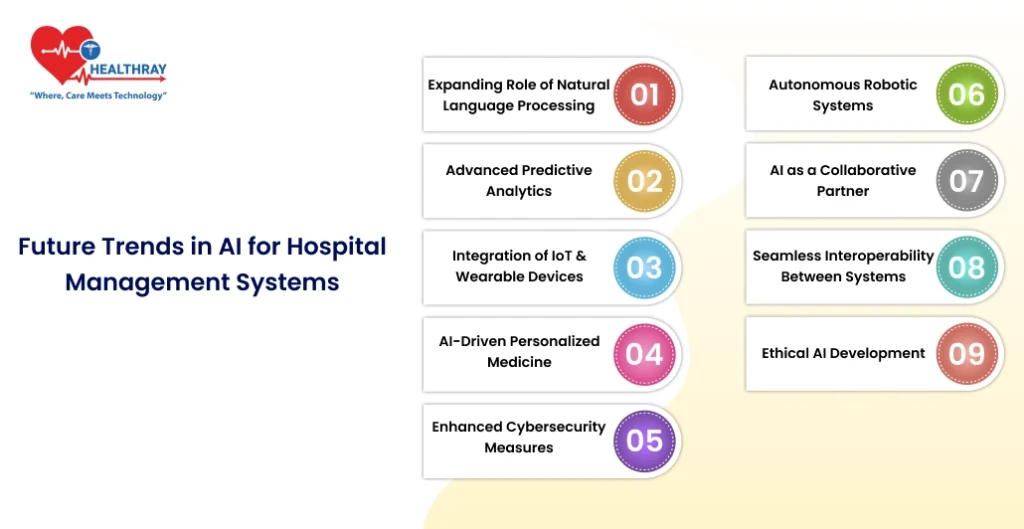
Expanding Role of Natural Language Processing (NLP)
NLP technologies are expected to play a bigger role in hospital software. AI systems will increasingly use NLP to analyze unstructured data, like physician notes and patient feedback, for actionable insights. This could improve decision-making and patient satisfaction by identifying trends and areas needing attention.
Advanced Predictive Analytics
Predictive analytics is set to become more sophisticated, enabling hospitals to forecast not only patient admissions but also disease outbreaks and resource shortages. These tools will help healthcare organizations prepare for crises, optimize supply chains, and manage staffing more effectively.
Integration of IoT and Wearable Devices
AI will integrate seamlessly with Internet of Things (IoT) devices and wearables, providing real-time monitoring and data collection. For instance, wearable devices can alert hospital systems about a patient’s vital signs, allowing healthcare providers to intervene proactively and prevent complications.
AI-Driven Personalized Medicine
As precision medicine gains traction, AI will analyze genetic, environmental, and lifestyle data to recommend tailored treatment plans. This approach will lead to more effective treatments and better patient outcomes, especially for chronic and complex conditions.
Enhanced Cybersecurity Measures
With the rise in healthcare data breaches, AI will play a critical role in strengthening cybersecurity. Advanced AI algorithms will detect anomalies in real time, preventing unauthorized access and ensuring compliance with data protection regulations.
Autonomous Robotic Systems
AI-powered robots will become commonplace for tasks like medication delivery, patient monitoring, and even performing surgeries. These systems will increase efficiency and reduce the workload on healthcare staff, particularly in high-demand areas like operating rooms and ICUs.
AI as a Collaborative Partner
Future AI systems will be designed to act as collaborative partners, supporting healthcare professionals without replacing them. This will include interactive decision support tools, virtual assistants for patient care, and AI-driven research assistance for clinical studies.
Seamless Interoperability Between Systems
Future AI solutions will focus on creating interconnected systems that allow seamless data sharing between departments and even across hospitals. This interoperability will ensure a more unified approach to patient care and hospital management.
Ethical AI Development
As AI becomes more prevalent, the focus on ethical development will grow. Hospitals and tech companies will prioritize building fair, unbiased AI systems and establishing clear guidelines for transparency and accountability.
Conclusion
AI-powered innovations are transforming hospital management systems, making healthcare more efficient, personalized, and responsive. From streamlining administrative processes to enhancing patient care, AI offers solutions to some of the most pressing challenges in healthcare today.
For healthcare administrators, IT decision-makers, and medical practitioners, understanding and adopting these technologies can pave the way for better resource management, improved patient satisfaction, and significant cost savings. While challenges like high initial costs and data security concerns remain, careful planning and collaboration can help overcome these barriers. As AI continues to evolve, its potential to revolutionize the Hospital Information System grows, offering tools that not only address current needs but also prepare the healthcare sector for future demands. The time to embrace AI-driven solutions in healthcare is now.
